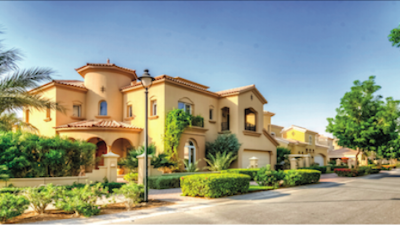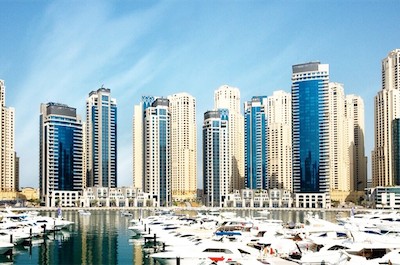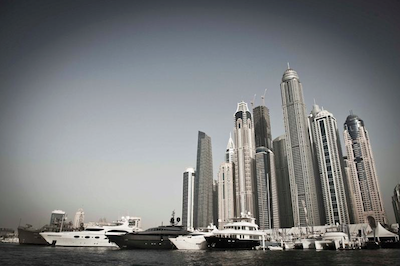Falling real estate prices in the United Arab Emirates' city of Dubai may continue through 2016 and into 2017, according to a new report by Core Savills.
"Market In Minutes: Dubai Residential Market" notes that lower oil prices and a large supply have organically lowered prices, but expectations of falling rates have served as a self-fulfilling prophecy and compounded the drops. After years of economic growth following the end of the great recession, Dubai is experiencing a market slowdown as global regions show signs of volatility.
"In the mid-term and until 2020 other key historical drivers of the Dubai residential market such as its perception as a regional ‘safe haven’, the ability to obtain a visa, the variety of investment options and the pleasures of a second home in a warm, sunny climate with improving infrastructure, will continue to ensure that Dubai remains an attractive proposition for residential investment for a wide range of regional and global investors," the report, researched by director of research and advisory Jim Drysdale, associate director of research Safeena Rangooni and senior manager of research and advisory Prathyusha Gurrapu.
Up and down
Dubai is not as reliant on the oil industry as many of the nations in the region, but the economic repercussions of plummeting petroleum prices are being felt globally. Declining oil prices, along with unfavorable exchange rates and sanctions, have also curtailed Russian investment.
These falling prices led to an 8 percent rise in an apartment’s average transaction values in 2015 compared to 2014, with Indian national, United Kingdom citizens and Pakistanis – the three biggest purchasers – all seeing an increase in average transaction value. Villa sales meanwhile declined in both number and price as focus has shifted toward smaller, more efficient units while thriving, expensive neighborhoods had supply shortages.

"Market In Minutes: Dubai Residential Market" cover image
The reputation of Dubai as a safe haven relatively secluded from surrounding geopolitical instability has kept it popular among Gulf Cooperation Council (GCC) and Arab countries. The average transaction from GCC buyers is 3 to 4 million AED, or about $815,000 to $1.1 million, indicating a healthy luxury tier that Core Savills notes is more likely second home purchases than investments.
However, optimistic economic expectations have buyers ready to make purchases, providing a counteracting stability that could cause an early market rebound. The 2016 Dubai budget proposes increases in infrastructure and social development spending, and job creation is trending upward.
Moreover, the release of Iranian equity, a potential increase in oil prices and a growing pool of investors waiting to pounce on the market when prices bottom out will bring prices back up.

Dubai Marina
Also of note, Dubai is among the most affordable major international cities in terms of home pricing relative to income, but that also makes it among the most expensive cities to rent in. As a developing economy drives renters to buy, prices will increase and lead to new construction at all price levels.
Although the market has hit a speed bump, the relative ease with which visas can be obtained, climate, geopolitical stability and continued development will help Dubai prosper in the medium- and long-term while keeping it afloat amidst economic uncertainty in the shorter term.
Dubai development
Despite this housing slowdown, Dubai is still an emerging hub for luxurians, with real estate being a prime asset.
Despite a variety of sociopolitical and economic factors, several cities in Africa and the Middle East, including Dubai, are emerging as prime places for real estate investment, according to a recent report by Sotheby’s International Realty and Wealth-X.
The ultra-high-net-worth population is poised to experience a massive wealth transfer to the tune of $4.1 trillion from aging generations to younger ones, and much of this money will find its way into real estate, a preferred investment channel for the younger affluent. The report pinpoints the opportunities and drawbacks of significant regions and offers some investment advice (see story).

Feadship yachts in Dubai.
Middle Eastern economies are still in development, but the region’s UHNW population is high and poised to grow quickly.
As a result, the Middle East has emerged as a strong market for private aviation and yachting, according to a separate report by Wealth-X and WINGX Advance.
The typical private jet owner in the Middle East is younger than global jet owners and, despite an average net-worth of more than $500 million less, has planes an average of three times as expensive, near $50 million compared to the average global owner’s $16.4 million. The numbers show not only that private aviation is a viable market in the Middle East, but other high-priced luxury offerings could also find a home (see story).
{"ct":"CfYlD1o9AbGX8FLCLwLpVZyq3S7XdDM5K2g6TysX7n1TydvqM5wRuN7XjpbDPKk0exZTxcPcy3rL8FbdQyks7SnxiNEy8U8KkXOpWtNlLaViTIdAU3n\/0K3UVWNMY+lnLkaMB\/rmrke\/AEH7ITczzb0e3BcLO0hil\/7nL55nLJ+KuP7vlTifPh1zIhx4koeV6QGw2ds6WurMN4pyNAuEIldGEy\/drq0njm344K3TAFaDb2klG5CS+E5Urdmnj7NqG+wuDff270znKXmKFPXlC\/NqdGZnP8DXFozlz+agtzmZaIbPK8tc7i4bKaWs4wSl1D7WFSC8PhVLeDSSuuw3IOyV0fSRrjJA\/w6ev15gEBrnbPbVQBueUomrzd5PxsErKiLW+DLinTEI+TCWGZs3HURWY3Q1wX6EmEu5sNNca3FVN8O7PACQbYSBnaXDjYfRP\/OXgHKu8Brj62OzdjHHgtTKTJuIGDU1jMccVpEoT7eS5lJLyvU8h\/Mvtl+2YJ2NhF74mVewEN4kpyp9Q2WSWw8OiMNgL3Yo8egpnMGNsY1w4Xxpy3h1iqgKGGz4E\/vS1IvKzSer07uL48owB4sGcDvFoIMC4KfqrHgXPCLuBXJ1hvLW1AW1jKqrdT6cQgc5BYFaUU7vCPYZN+2gplOHZ\/yNXP8X85C1h35v\/stljKktFzVO0veCEEZ7pnzpgJ7BU5O6OHCuL5U5I6IvSonVn2GWicfj4CTU7Fn7ke89+iITAa1CPsJqEa6gJ+Ty7FM+G5G+RblBG2RBHkr8PCH\/jsrNcKyxNhgdVg\/u\/CHuO+LL+HrH5rleInoCKEiL\/r58zBdWimDQjkOS+b6vYzDoynf7bSUK4v5bIp\/0HPMLZgAAA1z1wXqXPPB0NyHYTNtARgJrWMc6y2XOticqGSRcLi0DSQWRbCZ\/6R9ZuE7GAGLdoK6kYEqNzsXvPvwVoWceV43K0nphwj8uBhuNJVE0TV5dqnSSKbW7Kcz1F9A21B1pQ8h5M1XL9pq3S3791mOv0GH6YCNaRqKfau3jwxjjl4rb2ItTSAJ0bEwOeSpa5Z55UBt65hRVLVQP0c24TI+eiBvMjaIme+6VwwZtVBWG3gUg0V+OVPOARfuO5QXEjL9H77YvRSx6p5uNiv5ZBh5iE7AfWWG6WJ835QwxcI8xGZDr1alhPY2nWI3zkiNYrQSMHMceLlC0Jw4ALNvRvJoFpzO2U+\/H5GhUKx+NbsZFn+Sunk3XoE5s\/8O9eTX3hPt7ZB6yNNVpnvGTxtBHo9ccFjCGADNEnJWOQyry3Tdpqf5jRl5IaqNhdGwLBv0SsMowjZlmWgbH\/t87R6C\/VHZEQ356BQv+Zg9jGpuhKd20JBwzhh73bGD2cRmsg90VPYNz+1BgMDLKmF2Alx4tR6zwqyftqaiGrdRC\/xpt11EC26m+PawWhjCGAJSeCiFktIeG5B1V7pZ1YGq8LDtC2J8X0fGQf19k3Jn5E9CqkNDN6KdNBu5JI\/uEHYBU7lA9gLATiiiZ\/okxObrISLBbwGPk8BsyDMhZaI+zQdKT4aefF5Ko\/sHbU4\/xDUHsIb3age6uz37Gh3LC1fBOkXjGQdFZgBT2vJZHoBPguO9hRtsPnDNnb2Ji3mm6IOoWg3guQMVc4GE43f\/YQdbGHIYBrFERLm557YV3cs+afB5pRT\/54nGan01XmFX7P6OaWLbHE8zx+VbLDKWTdcrS+S6RF8ga3vQM\/it3kNcdX3zxkssRWXdO0x7Ju87lr7g4Tf8AdmBOy++qwM1WSfphcz4jLxFiEyxgJI9HNGlEmjeA\/wxyvUCvzDN32kQj8pxxJqtfL3wTxeqdA3oGGuL4arRe0WL0bfPhEEorhrs4Vg0zB1pkNhrBehCu9V25tW7WMurDA0CM6QmeeBbG8gb11cYI8xBh0kcRDsflJH4aknIetGOwJdHj2JydjJpV9SAuThFIlnEc7oCeQUewoR2cSeoRKL6CLOEMBI3gXRDMRjXECnkrh\/TXAtjWGt+tglG3DKtDJii4UG5AYfy2YXoDT3X07kMZSuQmmDCY8EbnfSrrKY6yMwsimOSkTMm3\/KGuGJnqn2ot8DIJxkVDKDdlLVWTTPi73v+uVl3QTWeRqq4CealG3vD+sMtC6rHAyAySIyWV1w9Heo\/8IbyjP22N\/Yq3f5SZJCKoguD4VpBZUSJckEmltDdcfkPGKOnOFb7jCpE3ZrCsbrSCls756G70\/3L8NqsEhPbTn2EQJHPCXAxuiXA2ND5z9+3K3kZ45hVrUU5sIoS8O4L8gBryovEZUihDxnfqcrFyjX8Ij9Ukzc5QMh9edhqkUXSMmVTFeDjveeSweXKMhmMRnZdZMLLWcH+lvMAmllklFgyymdL4jbHavJY1QSt3NcEjj28G67PFyyy81f4K+b+2z6wuw3UPwzLG1eAtGLLfwgjGHxcswNgrrtAcn0GmtXSE26PhM0vpnhZVLc0l0iMvQCgtTdMtCKCpTLM7HhSIjZLktycqhx0fmOGLdq6RZWJpWLIo5telX7fr2zlgWwmLCmbO2pAxW+7HNopXDi90ZRTeru+RhTTiOotp8vi3IOCSGFjKMeNMZq9TwiRcOa3gtTHwOBIGu1IvaS\/bGIME8FMsaPNPckOUpOlkccbzKd\/zuNLD\/reKjzFu6SqghlrUvMS9iZNYr+bVCc\/QWNFETG\/VKMQPjYcdysGRF279D2zCYrtzZQbdFR63ok8\/NoCWWuVsmIg5H0G3iGePXJDmGFzOhKc1Xge3HW7FHzsIVqXVtoQQyC1+jvvtksFMRGcUBYMKWmxNqu6JSTUt7aW8tXjK9ZYHP3fLNbUhCggyf8Ibb3VrU5YGsKZ19ESj7NpT7raEIxn6AMRMbqzAlIbKZ\/MaFS5c35UR+jzTZTwRQf3yKcxoVlvd7Z5rtuhOWN5utDpe1vh5LYFAkHIskolkfabBFQrbrZ4AH+XeyHpRg9XaFfdTfuzAM6sNhOcLUUQjjj1JQNemg1g0btPdzxLpjRNNLpR30ovtdqd3YDeKdjVDGosslGYXsYXVqoOyMWw1l8Zw4ZnlxrpDXZMOFoq3zBr4v\/GO0gWEojpvbDE6fQbDeMWZXlFKdztTN8A2pzW9\/1bdgkx7OduSQkMXtI\/xzyF0eu42pY84NRU0LHyiq3xNapOqxx2DU7BU384AuZD1LINOXaoKRUi3TIjiDd\/1xV+aFjqkX2yofmvbk\/aeTyyf+lcip4c6aIiMRw\/Feed9LS5mxY3\/KfkYfofZwjAns0iIHZWR3nCmZQxoGIKtCbI\/hsHv3PBBD1k9p8hEOLQk0JRw92GQQsXaedBMs3Y2\/t9v01FNmZkhzhm53ppK+XmEGYH6x+8dmu6nhIOtzz3JFXv4XcdISCKFTlpW+UbAOmH1cNEWdR1Dzh7Me77EGoAS\/jV2Z3JC1+PVVPFIqmdkYWr9u4TVG4rVauYz7YQ7kxO1cXNRT7LLbuJmEczra2yz4nibFBO26Ykl7ZuNybXSpXQLOCbep8KCVpUD8PD307g9CZN28Rknl4m+D2vzV+dTm3Qr1wroZbuwd+L5h42ZhedWcEUFCMWIxPZKZ2UXCHvNkLSMNK932z74GnopXDCyCGmE7wkiu6H72EOktviow49MVhNCCbJLOxo+hnd3M6fCQqqo2qzW1qwKuZPyO\/xHlvexT5JeAsNTcJVENr+cGeh1bXVN3tlcIXIKF06Wtt1bGVAmslYIQfDroezmDMpxSTf+g0KXfMgLK6yrAios02igzxNHmSygIbcDyOePM6oYYgM3kdcnVSTEGMUPOyHDgkyCwr+j+UQelpecg0i\/7sfIOR8aAAdz5PEUyDB8zsxnTCwvaKVxcOq97nlSY8cyKca7lxenZ1+YbiZEFJ1YQf1ZozHfS8f67V2DCBtVwKKGajR\/SS2vuTvysHw48VYmmARCnaaRCmk5cW0XLOZni38uiZ8goRJ+S9cvW+3Ajw+\/79SWVxr7pQLElywG8OYpWllU+JrjkD7oXYMWWbtQ4XAjnHzLpCtsze12gWTppvIhkzJCTfDh16zTrYv42ng\/ZYG0fRigWGCMszhirMzFSxmSBdsrtdkmfcLDvOSZNLS18PmT0orOdIMkB94eeBx8UT1X46etlvUqNXcDKlsxGnBkYWLE6dijsvdgRVjfdU+f7SmzSUCbif\/wxZaAK8Di4sS5kk\/m8\/IpkCRL\/PE\/oWioMAgcVBTJ75QZxvyxXFfwm7ba5R7JCfTSE3x4vHr8BT3stjboyV429itthiZ6HAFmiGf6tfHH3JmMrx+bUWPELphqfcqyFNoPSxi8QiPm4aTdU5FaSBBQXrEaAS98PwOP2u1aBThdzeRSnxIDziZXrAyV17\/waFBoycVUkadVZOqNydxUEP8CglaF2P\/ao7enOSm7LB5SFFPLP6q0XkQE4aQQJQ+tWY0DIv2+PKn3gmUrR2OjApc+pfTAsj\/V9DON2\/8jcmv4gj5ujrKk\/b\/vOB4ySzhIKaAbz\/gZrfZjanvLgnFvEhLLT59i5xanvmDUM95COgMpwA5yx47+bfSETy+Q+sXr9abOdGRJawMRtLFTmN+jPmLLlJOs8Md7\/AkaZN5XGkhbPb\/Ly6K4rYt8mZAEx0SMkIjrVY9yiJx+G8BtPbtJf1J4tBbgVE8Q3sl\/cwD9+yg8\/higGre33bG7Jb91LfqTokF9BJNnVjztYKynhNz5v\/H0s2Hy8CrC3Pd3K0lgjyIFPZqnNn\/+jQqVDDFJiQ5RbadYIp6HeG4Ki93PHsoFyP\/zQFT6JuaLIPyvkE4aQcPkL6rE8lhpOt+KWpzKrJ7jCfXbXrZ3TnA9IoXjpP\/a8nRDmKd0tmHOSZwtqIiJ2dpYlfoy6kxCLrqNp4DZsklWu9OAFX7pcnwWst7mKXamwzWdQqEbA3RpOOgSpM3CqdOuXUDFhTp3u72azyZng7ef8IVLdxUUDvsLJgeA\/n+W5x8Wn4TFUS2YSOJvaFPtvmXN5JeR2u6mNk9+OkT0xdYtYt1xjtJ0uQ3WgwibP94dJ8ReRNG8xxhSKLU2kGAfKPESkCIeHcISGi61WhEe6okPizbCw3EWUyEhPEaotpQX6xy\/xCSxsa58GL+SY\/gN3jHHQZfMo5rWr2PaJwDrj3QF6NrHvM4bv5hF7U6qU2CErqmgt6HGHcE3DoIkcf\/fJCdL9mQBEwqIJLAdV0t9Q72hzQf4b2SweHPcxxwMLtjnx3RHqPPWyvmP14STgXBCo5rm3JBUDhpGMTNUVD\/2hkxztgYFFqJWOeavzSTEHmxTdfiWM+ZrRas\/xeYDVtP8v7tdY1b8RR0iBRV\/HdIODqEmIN8wkOdRS1xOD95dC1ONnfQ\/E0ybnOEOE0hhDNHzSiAbT6QbR1MsnvJasziYN7EEzrGVT3nj01PaB0wLrrswXnfSLOyzgo12mQfq\/qa3jnKIiOTd2P44ByhGnwlp6O7sbIj6NOKIs51E9UySOWp\/GlN\/Ma2mSxn01z0d9ehVKbb\/yaSlwsD7oSBewPGbFMlKHh5lMMNiRGVHTHxYaHcqx\/fyz7DW+rEGBZzMuCH37EK\/zMR9ZKSgaBBNe4gZMH\/qa6fFAXLPe+I6wYFOD3qBp7EallB3ugCRSFwu51pNhlJAC0Oj8CTwl9FjNN\/RwWBumHAgSyO8jAarxQmCjC94PBzPgpGIMFWXhlveUBJWnD\/YaeN3tEYWTvK2yILPqezWRALjjVKjWwkdJEjkiFLd6XwAD20HqWyNM6TS2zuvrTAvYA1dozoVy5njkwAZ8SJyPKBlxBm3viu\/b98xQbixDYXUhOPCKN\/+d1QGCwahcxoPR6Z+zQ9JHDNh1HGmVJcI\/eJSOpUqi3wrHX09rCaiZrkgLJFCPaFfasfLOTkNMQHtA5V\/krI3Rclv659f+qy6IFYjBGHjPOsjV5Doc0mWt56tPNeC\/JTlh1p0teqgloNoQUf7ylHd+baDU7JWI3sETWVbJnAJQoRRtljcAYETqDU8g3HdrWlOY16z3altcXoSG6MOWB0wWVIn75tcDNynvriOrIynDDiyWU2YHbOGhn5xaUUVjb6SIYRMk7tV1\/oYZy3QZN+MHT+nDurIHMTp01W40L4eEsbUZd9mJoRB73zbdece64JlRBk+1MNXRjeWjPW3G7PlhGfmkD5MXKgsD4h0OeiByst0n+bqfDBIcW8eg+DO8tQHGhqZj0\/6TIWx9Mcje0+482lomUm+DabFZhtSSdrmt\/DJvZAvFBY+JZCxSQuBllZZO7\/On2J2ty8By7TMX\/3aVMtD7dtt9Gl57lD8nThtEwkGI4zFyfPSwqATtbFK9EHg835vgQp1T45EaOoWUhxacYUueGCEwokQSx+gMP6fngpOonIGGf8iGoLxElKNIjFAP1dywGwpJ75xhPV3EUdl2qDSCwDLpni1gDtj7fOw9ApRtSy1SQ+aAL1170qTGnMeWSN42WhA1ZZZtXDvfJy5uaQmbHlPe1ekaOMfEO2TxZR2wGHnDllTlhdilbIsNsvfwVQ+tlmTYVl5Z6pYDy4v5xHDWQRUiB374\/4JraUnor9fkAlontCsm717FSlS3j4+ZAWM4K91ISUvHpgzDcOP2iIGYd4oQcyOQbwBg2rf4E4y5tVrHdSr4FZ9mUy12yr9GbyYq9OiBjFZucIu1qC\/R3Y\/GWR\/K\/M06Eos5IjFgQyEqkUR29gKLKUbaxz9YfFSu1fmTYqm9UI7hUCyJFzdJzXGM66soJ4YxBHHP9HzohWxznGurVFM5u\/aM7xDNr8cxJb4+nORkrZEM02ttDzFqPNXeBuGVNENItWyPmKAeBtdngB7\/dht3Rz6M+zAoUtxbzUrv5dPWzVwjlCdI+wNgtXAoVXXftX7LiKbQTQiXzDAxVDjaP\/Oh2THc8Lvvj4gcqCTnLh9sb4ZvTdIRiRElaKjOoKdfXyeIHux\/qYB\/Ff7jiuSDz2OJXMvCH+4XmqYatG3aNexwu7yWxg6n67s2qkBjO4yjIjlRlgLBK05REM\/rqgAoEdTT2m4JtLvmEItkp\/GQ1FuL3R+J2VToSOP8v0WEjLrET9GG9PYO4ryNSujObMREPuzQ3dklIy0vMxH4KKEkKTGIvmOxOAVjF5eAhiytNd6odwOm\/WM+DAXndNDO3sWzt1\/FAZ4+uEYVk17Yy4IPY3ylQILLFOgx5sdRYbgdntsPDkPxBr5Q0iElqdjn4azESLSKMP9CUyXQuIK5xxdB4k\/Oc5PiuNt5h+MdXGRd8980OGhLCEt6uhWX\/hRcr4LMemOzuBoOvkkbTx9DxCloUkIVnSA4aEaAD4L8e37tQvZ1DUsJH+83B1rXgiuoPHzPS2nSv7qelNcmR0k1K6oK2Z6n9e1AtgpT7lOn+8RISR4s0n5Ts0Jp2yceA0b18E3LKL9aJJpfp2UoBdL2xR5Usu\/zaFtpLJUm5F8QPCxv8WZV9OrJleegaOnn6P0Nd9+ce+BshaaMp6KpOEY81SioqXoRfztyjGsdIlSrhdg1EM1hlm2gsiDuPKGBIYCF7NBG+88HR2PH0RadagznmyJodEEFXED3rOReuQ87xoXmdMQmYi1+d0zQdG7DYGhNRnFG4VWzmpD91u6tjxmuXlxbTQGvmO2Vxuj2dZE1\/JePndt3Q05HiOUHwQGwwkgw7AM2GIgwY3OYV9mJJAtRjKeTwoIoUWlkaFq8jUwL+Edwz22FZfD6X7Ens5u6IA4UfhVRnaFWiakQvj6NpfSrISpY9YBiY78bbuEwsn1c7bEQmZItpHj3F6gbS8u94El+HFCm45I8dv24nfuQI7ZjvIYOPMqfupBtuLlX7t5lAatoyG56WQtbAABxwOrxu0YQqDukTdFL2WsMouOH2AMnftqwGHN0s\/iMuqjb2T7mP1n49abMvIeBVQQfIMO55Uf5gEgTqb9bhf9+ezM\/Fb46bxHf9ssI7bZ9kI0TVOaQmcc5KxunoOQu1uY5a53suxCT9yWkcMpzX0vp8wapxHU0cRc0p3PyHTfPh51\/1B2xWNrELkRQDaVtZW+RFPhUUjob4DQa\/B2u5NZzcEirRoK1dX9lu1d4cqWLkAb3gOTV3xt8uUvQEjaKIfPizs12S1MG5SxP0onv6YJnuRTA\/OATzjBFyveRcEKQVZAscvTiu2Ej3lR2YYB5fskSCnxvRqsqafWqWnaP0MlWEAJE\/nmAP\/W+oEBw4dy4Q6PRz4dL+XvqnGDietLm0Z00ksJ\/FZck+\/BRqJ0jUQuN7LqIYq7WwzeakeXO9qsRbqaHhdkBKmzA53Ka858POG7zeokoweduGUy8KKKzsbpeEXWMmMya6ssLvm+qRM\/RWRmeX1CwLhOC9yBaAJkIXAQPRGfvTdrpCbgA5OFhe\/2MzUdt0Wky3e7xBjmem8+vCy4\/lYn9PkzUOj5mHrwlMiUQKJa6NM20yWRfrzK4RFyFiRJC91BtCkekkR3M+oGwzVbCRMij7EE2koPR6BAvyf39BdI9EQaryoXdNSGW2W9LYQq7ynORusMww+T6UxhBzP+Jgpx2UHjihXjUH9EkQNNT\/Y\/Cnnt8ICpRTLu5PR7EJ8rLmnWh+5q54fP0W2W3hIelHEA0P3Vw4IA0OvLukeOlHONnLdC+\/zV+kbJMbCYVyyIR6boGE3C\/PU8Ob0taSACJZpYHZQP4xFNSsLQs0BZJQ==","iv":"6dc58b22a97a156bd6037f002c24f15f","s":"ca30e6909533032b"}

 Dubai; image from Core Savills report
Dubai; image from Core Savills report